 |
 |
 |
World
Trade Organization Symposium on Issues Confronting the World Trade System
WTO
Headquarters, Geneva, 6-7 July 2001
 |
Photos and RealAudio from Friday, 6 July - Work session #1 and Reception |  |
| Other pages: July 6 AM: Opening Plenary - July 7 AM: work session #2 - July 7 PM (Closing Plenary) | |
| On this page: Agriculture - TRIPS: essential medicines - Trade and Environment - Civil Society - Reception | |
| Agriculture - Issues and Negotiations | |
|
Timo
Huhtaniemi, Ambassador of Finland to the WTO and moderator of
the session, gave an overview of the role of agriculture in
the WTO, noting that the results of the Uruguay round have not
pleased all parties. He said the effects of the WTO on agriculture
cannot be separated out from others, such as policy shifts due
to domestic reasons. |
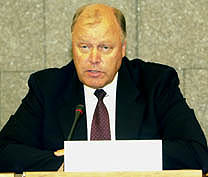 |
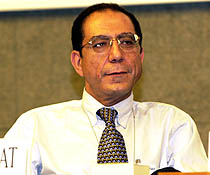 |
Magdi
Farahat, Permanent Representative of Egypt to the WTO, stressed
that while billions of people in developing countries living in
poverty, subsidies worth one billion dollars now flow to agriculture
in the North. He said agriculture cannot be considered to be integrated
into the multilateral trading system, which contains more loopholes
than it covers.  Listen
to Farahat's presentation Listen
to Farahat's presentation |
Risto
Volanen, COPA-COGENA, highlighted the situation of seven million
European farmers, noting tensions between pressures to produce
food efficiently and cheaply on the one hand, and to take environmental
issues into consideration on the other. He stressed the need to
make use of both markets and government policy, and underscored
the multifunctional nature of agriculture. Listen
to Volanen's presentation Listen
to Volanen's presentation |
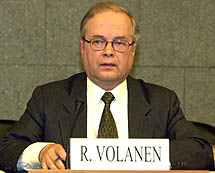 |
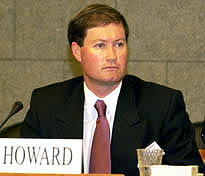 |
Lyall
Howard, National Farmers' Federation, Australia, highlighted challenges
with regard to global poverty alleviation and the need for agricultural
output to double within 50 years through improved productivity.
On the involvement of NGOs in the work of the WTO, he called for
criteria placed on NGOs with regard to good governance to ensure
their legitimacy. Listen to Howard's presentation
Listen to Howard's presentation |
| TRIPS - Access to essential medicines | |
Adrian
Otten, Director, WTO Intellectual Property Division, stated that
the core issues of TRIPs and access to essential medicines are
how to meet the public health goal of providing incentives for
research and development into new drugs, and how to maximize access
to existing drugs in the poorest countries. He outlined recent
developments in the WTO regarding the question of TRIPs and access
to medicines.  Listen
to Otten's introduction Listen
to Otten's introduction |
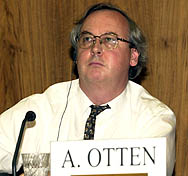 |
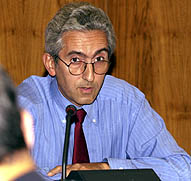
|
Carlos
Correa, Professor, University of Buenos Aires, Argentina, outlined
the evolution of intellectual property regulations, highlighting
the universalization of pharmaceutical drug patents. He explained
that patents are intended as a mechanism so firms can recover
the costs of research and development, and that although price
is an important factor determining access to medicines, other
factors include distribution systems, pharmacies, and education
of the population.  Listen
to Correa's presentation Listen
to Correa's presentation |
Jeffrey
Kushan, Lawyer, Powell, Goldstein, Frazer and Murphy (USA), underscored
that the TRIPs agreement is not a public health agreement. He
discussed the pharmaceutical industry, including the process by
which new drugs are brought to the market, and explained that
market exclusivity - the sole right for a firm to market a drug
for a certain amount of time - is essential as an incentive for
product development and to capture revenues. Listen
to Kushan's presentation Listen
to Kushan's presentation |
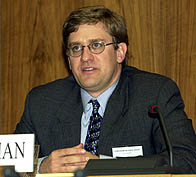 |
| Trade and Environment | |
David
Runnalls, President of IISD, explained that work on trade and
environment was still necessary after many years of research because:
there is still debate over whether or not environment belongs
on the WTO agenda; there is a strong suspicion in the South that
the North will use environmentalism as "green protectionism";
and suspicion regarding accessibility and transparency of the
WTO and its "real intentions."  Listen
to Runnall's introduction Listen
to Runnall's introduction |
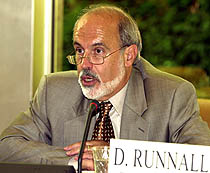 |
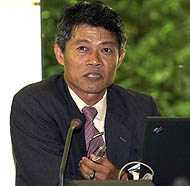 |
Sitanon
Jesdapipat, Associate Professor, Chulalongkorn University, Thailand,
described issues relating to MEAs and the WTO, stating that the
main problem is the use of environment-related unilateral measures
that end up going to the dispute settlement body. He identified
future challenges, such as exclusions that might result in fungibility
of flexible measures under the Kyoto Protocol; and "free
riders." Listen
to Jesdapipat's presentation Listen
to Jesdapipat's presentation |
Laurence
Boisson de Chazournes, Head of the Department of International
Law, University of Geneva, Switzerland distinguished between the
two different types of process and production methods (PPMs):
product-related PPMs, which are generally not a controversial
trade issue; and non-product-related PPMs, which refer to the
environmental aspects of process and production Listen
to Boisson de Chazournes' presentation Listen
to Boisson de Chazournes' presentation |
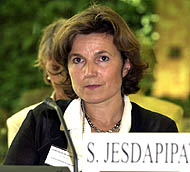 |
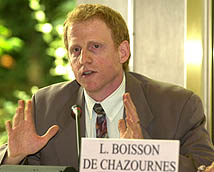 |
David
Schorr, Director, Sustainable Commerce Programme, WWF-US, pointed
out that eco-labelling, "green" government procurement,
and recent challenges under the NAFTA Investor-State Provision
(Chapter 11) have highlighted the tensions between trade and the
environment. Stressing the importance of "win-win-win"
solutions to trade and environment issues, he described environmental
problems caused by the heavy subsidization of the fisheries sector
worldwide.  Listen
to Schorr's presentation Listen
to Schorr's presentation |
| Services - Regularization and liberalization under GATS | |
B.K.
Zutshi, former Indian Ambassador to the WTO, highlighted the question
of whether the GATS agreement constrains members' freedom to regulate,
how and to what extent? He noted that regulating services is aimed
at addressing issues of market failure, public concerns and consumer
interest. He said GATS explicitly recognizes members' right to
regulate and even re-regulate, which is unrestrained with the
exception of obligations in terms of notification and "reasonable"
application.  Listen
to Zutshi's introduction Listen
to Zutshi's introduction
|
Julian
Arkall, International Trade and Services Policy, highlighted the
policy context of the GATS agreement, noting the preamble contains
the objectives of the promotion of economic growth of all trading
parties and development of developing country parties, and provides
for due respect to national policy objectives and the recognition
of the right to regulate. He said the interaction of regulation
and liberalization is the central issue of the GATS.  Listen
to Arkell's presentation Listen
to Arkell's presentation |
| WTO & Civil Society: role of NGOs in capacity building and in WTO institutional reform | |
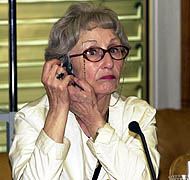 |
Moderator Sylvia Ostry, University of Toronto, noted the new, complex world trading system that has emerged since the conclusion of the Uruguay Round and its far reaching implications at the national level. She highlighted the asymmetry between the North and the South in terms of capacity to manage the situation. On WTO institutional reform, Ostry noted that buffers no longer exist between international trade rules and the domestic policy space. |
| Tetteh Hormeku, Third World Network, Africa Secretariat, stressed that the problems related to the WTO are fundamental, and the institution is experiencing a crises of legitimacy as signaled in Seattle. He noted that trade rules are becoming the context for domestic policy development, and criticized the WTO as being nontransparent and undemocratic, as in reality, most decision are being worked out in closed informal meetings which are dominated by a few rich countries. | 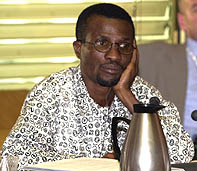 |
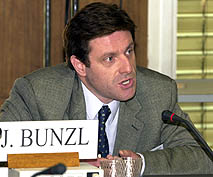 |
John Bunzl, director and founder of the International Simultaneous Policy Organization, explained that the objective of his organization is a sustainable global economy, economic, environmental and social cooperation between nations. In order to achieve the objective, he proposed the "simultaneous policy," under which capital markets and transnational corporations would be re-regulated, global taxes on markets, corporations and resources introduced, and revenues redistributed to fund sustainable development in the poorest countries on a debt-free basis. |
|
|
|
|
Scenes from the WTO-sponsored reception held in the lobby of the new conference facility
|
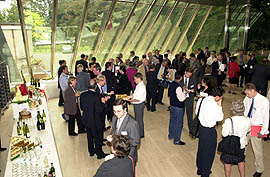 |
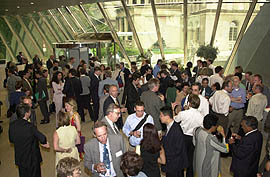 |
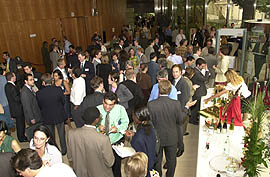 |